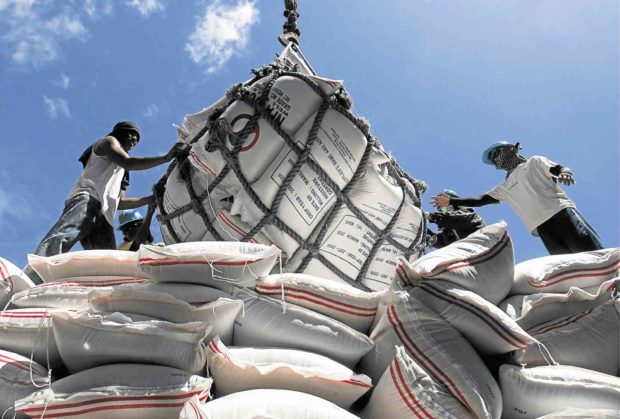
Imported rice from Vietnam being unloaded in Surigao City port. —FILE PHOTO
MANILA, Philippines — National Economic and Development Authority (Neda) Secretary Arsenio Balisacan on Monday defended the planned reduction of rice tariff rates, saying that the decision “was not made lightly” and is merely meant to “ensure access to nutritious and affordable food.”
Balisacan made the pronouncement after acknowledging the concerns raised regarding Neda’s decision to reduce the tariff rate of rice to 15 percent from 35 percent.
READ: Gov’t slashes tariff on rice imports to help cut local prices
“We understand the apprehensions and emotions that this decision has caused. As the Secretary of Neda and Vice Chair of the Neda Board, I want to assure the public that this decision was not made lightly,” said Balisacan in a statement.
According to Balisacan the Neda board made the decision based on its “strategic importance in ensuring access and affordability to essential commodities.”
He also noted that prior to the approval of the tariff cuts, the Tariff Commission held extensive consultations and reviews under the Customs Modernization and Tariff Act (CMTA) as early as March 2023 with 801 stakeholders — 192 of which from the agriculture sector.
“The goal of the NEDA Board in reducing the tariff rate of rice is to ensure that Filipinos have access to nutritious and affordable food, particularly rice, while managing inflation and sustaining our economic growth momentum,” said Balisacan.
Citing the Philippine Statistics Authority, Balisacan said rice “contributed about two percentage points (or over 50 percent) to the headline inflation.”
Because of this, Balisacan said the decision to reduce rice tariffs was made to bring down rice prices for consumers “while supporting domestic production through tariff cover and increased budgetary support to improve agricultural productivity, especially as global rice prices remain elevated.”
“We understand the concerns of our farmers, and we are committed to supporting them through this transition. We are investing in infrastructure, promoting the adoption of modern technologies, improving market and financial access for local producers, and building resilience to climate change,” said Balisacan.
“We are also mindful of the need to manage inflation and ensure the affordability of essential staples for all Filipinos. High food prices disproportionately affect the poor and contribute to hunger, malnutrition, and stunting, hindering the attainment of our development goals,” he added.
READ: Tariff cut on imported rice: A gamble local farmers won’t take
Balisacan previously said that Neda was optimistic that the lower tariff on rice would bring its prices down to as low as P29 per kilo.